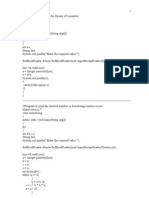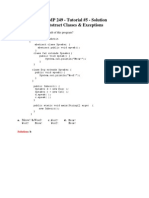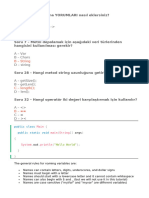PGM: JTM1P1 Objective: To Show The Use of System - In.read Method
PGM: JTM1P1 Objective: To Show The Use of System - In.read Method
Uploaded by
chitty509Copyright:
Available Formats
PGM: JTM1P1 Objective: To Show The Use of System - In.read Method
PGM: JTM1P1 Objective: To Show The Use of System - In.read Method
Uploaded by
chitty509Original Title
Copyright
Available Formats
Share this document
Did you find this document useful?
Is this content inappropriate?
Copyright:
Available Formats
PGM: JTM1P1 Objective: To Show The Use of System - In.read Method
PGM: JTM1P1 Objective: To Show The Use of System - In.read Method
Uploaded by
chitty509Copyright:
Available Formats
The following programs have to be used along with Java course material.
Each of these programs illustrate a particular point/objective. JT M1 M2 & M3 M4 M5 M6 M7 M8 & M9 Java Training OOPs and Environment Language Elements Input / Output OOPs Using Java Web Programming Windows Programming Advanced topics
1. Pgm: JTM1P1 Objective: To show the use of System.in.read() method. //Import java.io for read method. import java.io.*; public class MyCat { public static void main(String args[]) throws IOException { int b; // Key values are received as ascii ints. // read() throws IOException but is not caught. while((b=System.in.read()) != 65) { //Output the character read System.out.print((char)b); } //Output a blank line System.out.println(); } } Pgm: JTM1P2 Objective: To understand the use of static modifier. Note that those static blocks without any name / parameter /or mdifier will be executed before even main method. public class UnderstandingStaticDemo { static int length = 10; static int width = 20; static int height = 30; static int volume,area; public static void main(String a[]) { System.out.println("This is main method."); callStaticMethod(42); } static void callStaticMethod(int x)
{ System.out.println("This is static method."); System.out.println("area : "+area); System.out.println("volume :"+volume); } static { System.out.println("This is static first block."); area = length * width; } static { System.out.println("This is static second block."); volume = area * height; } } //OUTPUT: //This is static first block. //This is static second block. //This is main method. //This is static method. //area : 200 //volume :6000 Pgm-JTM1P3 Obejective: // Calling Static methods/variables in different classes through the class names itself. class Box { static int length=10; static int width=20; int height=30; static void area() { System.out.println("The area is :" + length*width); } void volume() { System.out.println("The volume is :" + length*width*height); } } public class StaticMethodCallDemo { public static void main(String args[]) { Box.area(); System.out.println("The length is : " + Box.length);
System.out.println("The width is : " + Box.width); // Box.volume(); // Error. You cannot refer to a non-static method like this. Box obj=new Box(); // You have to instantiate an object obj.volume(); // Access a non-static method through the object obj.area(); // You can access a static method also like this. } } //OUTPUT: //The area is :200 //The length is : 10 //The width is : 20 //The volume is :6000 //The area is :200
Pgm : JTM5P1 class SimpleClass { int intVar; float floatVar; double doubleVar; SimpleClass(int i,float f,double d) { intVar=i; floatVar=f; doubleVar=d; System.out.println("SimpleClass(int i,float f,double d)"); } SimpleClass(int i,float f) { intVar=i; floatVar=f; doubleVar=0; System.out.println("SimpleClass(int i,float f)"); } SimpleClass(int i) { intVar=i; floatVar=0; doubleVar=0; System.out.println("SimpleClass(int i)"); } SimpleClass(float f) { intVar=0; floatVar=f; doubleVar=0; System.out.println("SimpleClass(float f)"); }
SimpleClass(double d) { intVar=0; floatVar=0; doubleVar=d; System.out.println("SimpleClass(double d)"); } SimpleClass() { intVar=0; floatVar=0; doubleVar=0; System.out.println("SimpleClass()"); } } public class OverLoadedConstructorsDemo1 { public static void main(String args[]) { SimpleClass SC1=new SimpleClass(10,9.81f,1.11); SimpleClass SC2=new SimpleClass(10,9.81f); SimpleClass SC3=new SimpleClass(10); SimpleClass SC4=new SimpleClass(9.81f); SimpleClass SC5=new SimpleClass(1.11); SimpleClass SC6=new SimpleClass(); } } //Output: //SimpleClass(int i,float f, double d); //SimpleClass(int i,float f); //SimpleClass(int i); //SimpleClass(float f); //SimpleClass(double d); //SimpleClass(); Pgm: JTM5P2 // Avoiding zero assignment as java does it for you class SimpleClass { int intVar; float floatVar; double doubleVar; SimpleClass(int i,float f,double d) { intVar=i; floatVar=f; doubleVar=d; System.out.println("SimpleClass(int i,float f,double d)"); }
SimpleClass(int i,float f) { intVar=i; floatVar=f; System.out.println("SimpleClass(int i,float f)"); } SimpleClass(int i) { intVar=i; floatVar=0; doubleVar=0; System.out.println("SimpleClass(int i)"); }
SimpleClass(float f) { intVar=0; floatVar=f; doubleVar=0; System.out.println("SimpleClass(float f)"); } SimpleClass(double d) { intVar=0; floatVar=0; doubleVar=d; System.out.println("SimpleClass(double d)"); } SimpleClass() { intVar=0; floatVar=0; doubleVar=0; System.out.println("SimpleClass()"); } } public class OverLoadedConstructorsDemo1 { public static void main(String args[]) { SimpleClass SC1=new SimpleClass(10,9.81f,1.11); SimpleClass SC2=new SimpleClass(10,9.81f); SimpleClass SC3=new SimpleClass(10); SimpleClass SC4=new SimpleClass(9.81f); SimpleClass SC5=new SimpleClass(1.11); SimpleClass SC6=new SimpleClass(); } } //Output:
//SimpleClass(int i,float f, double d); //SimpleClass(int i,float f); //SimpleClass(int i); //SimpleClass(float f); //SimpleClass(double d); //SimpleClass(); Pgm: JTM5P3 // Use of 'this' keyword to refer to the same class constructor class SimpleClass { int intVar; float floatVar; double doubleVar; SimpleClass(int i,float f,double d) { intVar=i; floatVar=f; doubleVar=d; System.out.println("SimpleClass(int i,float f,double d)"); } SimpleClass(int i,float f) { this(9.81); intVar=i; floatVar=f; System.out.println("SimpleClass(int i,float f)"); } SimpleClass(int i) { intVar=i; System.out.println("SimpleClass(int i)"); } SimpleClass(float f) { floatVar=f; System.out.println("SimpleClass(float f)"); } SimpleClass(double d) { doubleVar=d; System.out.println("SimpleClass(double d)"); } SimpleClass() { this(10,1.11f,9.81); System.out.println("SimpleClass()"); }
} public class OverLoadedConstructorsDemo1 { public static void main(String args[]) { SimpleClass SC1=new SimpleClass(10,9.81f,1.11); SimpleClass SC2=new SimpleClass(10,9.81f); SimpleClass SC3=new SimpleClass(10); SimpleClass SC4=new SimpleClass(9.81f); SimpleClass SC5=new SimpleClass(1.11); SimpleClass SC6=new SimpleClass(); } } //Output: //SimpleClass(int i,float f, double d); //SimpleClass(double d); //SimpleClass(int i,float f); //SimpleClass(int i); //SimpleClass(float f); //SimpleClass(double d); //SimpleClass(int i,float f, double d); //SimpleClass(); Pgm: JTM5P4 // Passing the same class object as an argument in the class method. class MyClass { int i,j; MyClass(int x,int y) { i=x; j=y; } boolean equals(MyClass MC) { if(MC.i==i && MC.j==j) return true; else return false; } } public class ObjectsAsParametersDemo { public static void main(String args[]) { MyClass MC1=new MyClass(10,20); MyClass MC2=new MyClass(10,20); MyClass MC3=new MyClass(1,2); System.out.println("MC1==MC2 ? " + MC1.equals(MC2));
System.out.println("MC1==MC3 ? " + MC1.equals(MC3)); } } //Output: //MC1==MC2 ? true //MC1==MC3 ? false Pgm : JTM5P5 class MyClass { int a; MyClass(int i) { a=i; } MyClass multiply() { MyClass temp=new MyClass(a*10); return temp; } } public class ReturningObjectDemo { public static void main(String a[]) { MyClass obj1=new MyClass(2); MyClass obj2=obj1.multiply(); MyClass obj3=obj2.multiply(); System.out.println("obj1.a = " + obj1.a); System.out.println("obj2.a = " + obj2.a); System.out.println("obj3.a = " + obj3.a); } } //OUTPUT: //obj1.a =2 //obj2.a =20 //obj3.a =200 Pgm - JTM5P6 // Public Private Access Specifier class Box { int length; public int width; private int height;
void setHeight(int i) { height=i; } int getHeight() { return height; } } public class PublicPrivateAccessDemo { public static void main(String args[]) { Box obj = new Box(); obj.length=10; obj.width=20; // obj.height = 30; // Error ! U can't access private variables // U can access private variables thro' public methods obj.setHeight(30); System.out.println("length, width and height : "+obj.length+":"+obj.width+ ":"+obj.getHeight()); } } // OUTPUT: // length, width and height : 10:20:30 Pgm-JTM5P7 // A simple inheritance example: Accessing // super class variables and methods from the sub class class SuperClass { int superInt; double superDouble; void printSuperVariable() { System.out.println("superInt = " + superInt + " superDouble = " + superDouble); } } class SubClass extends SuperClass { boolean subBoolean; void printSubVariable() { System.out.println("subBoolean = " + subBoolean); } } class SimpleInheritance1
{ public static void main(String args[]) { SuperClass sup=new SuperClass(); SubClass sub=new SubClass(); sup.superInt=10; sup.superDouble=9.81; sup.printSuperVariable(); sub.superInt=100; sub.superDouble=98.1; sub.subBoolean=true; sub.printSuperVariable(); sub.printSubVariable(); } } //Output: //superInt = 10 superDouble = 9.81 //superInt = 100 superDouble = 98.1 //subBoolean = true
Pgm-JTM5P8 // A simple Inheritance Example: Declaring the same super class variable in the sub-class class SuperClass { int superInt=0; double superDouble; void printSuperVariable() { System.out.println("\nSUPER CLASS: "); System.out.println("superInt = " + superInt); System.out.println("superDouble = " + superDouble); } } class SubClass extends SuperClass { int superInt; boolean subBoolean; void printSubVariable() { System.out.println("\nSUB CLASS: "); System.out.println("subBoolean = " + subBoolean); System.out.println("superInt = " +superInt); } } class SimpleInheritance2 {
public static void main(String args[]) { SuperClass sup= new SuperClass(); SubClass sub=new SubClass(); sup.superInt=10; sup.superDouble=9.81; sup.printSuperVariable(); sub.superInt=100; sub.superDouble=98.1; sub.subBoolean=true; sub.printSuperVariable(); sub.printSubVariable(); } } //OUTPUT : //SUPER CLASS: //superInt = 10 //superDouble = 9.81 // //SUPER CLASS: //superInt = 0 //superDouble = 98.1 // //SUB CLASS: //subBoolean = true //superInt = 100 Pgm-JTM5P9 // Assignment of object references in three different styles // super class object = sub class object; -->No problem // sub class object = super class object; -->Compiler error // sub class object = (sub class casting)super class object; -->Runtime error class SuperClass { int superInt; float superFloat; float multiply() { return superInt*superFloat; } } class SubClass extends SuperClass { SubClass(int i, float f) { superInt=i; superFloat=f; }
} class SimpleInheritance3 { public static void main(String a[]) { SuperClass sup=new SuperClass(); SubClass sub=new SubClass(10,1.56f); float subtemp=sub.multiply(); System.out.println("Point 1: "+subtemp); subtemp=sup.multiply(); System.out.println("Point 2: "+subtemp); sup=sub; //No Problem. subtemp=sup.multiply(); System.out.println("Point 3: "+subtemp); // sub=sup; //Compile Time Error. //sub=(SubClass)sup; //Run Time Exception. } } //OUTPUT : //Point 1: 15.599999 //Point 2: 0.0 //Point 3: 15.599999 Pgm-JTM5P10 // Constructors Inheritance Demo: // Finding out what constructors are being called by default, // if you instantiate a sub class class SuperClass { int superInt; SuperClass() { System.out.println("SuperClass()"); } SuperClass(int i) { System.out.println("SuperClass(int i)"); } } class SubClass extends SuperClass { double subDouble; SubClass() { System.out.println("SubClass()");
} SubClass(double d) { System.out.println("SubClass(double d)"); } } public class ConstructorInheritance { public static void main(String A[]) { System.out.println("SuperClass sup1=new SuperClass()"); SuperClass sup1=new SuperClass(); System.out.println(); System.out.println("SuperClass sup2=new SuperClass(10)"); SuperClass sup2=new SuperClass(10); System.out.println(); System.out.println("SubClass sub1=new SubClass()"); SubClass sub1=new SubClass(); System.out.println(); System.out.println("SubClass sub2=new SubClass(20)"); SubClass sub2=new SubClass(20); // U can't invoke a superclass constructor. System.out.println(); // It will type cast it to double. System.out.println("SubClass sub3=new SubClass(9.81)"); SubClass sub3=new SubClass(9.81); System.out.println(); } } //OUTPUT : //SuperClass sup1=new SuperClass() //SuperClass() // //SuperClass sup2=new SuperClass(10) //SuperClass(int i) // //SubClass sub1=new SubClass() //SuperClass() //SubClass() // //SubClass sub2=new SubClass(20) //SuperClass() //SubClass(double d) // //SubClass sub3=new SubClass(9.81) //SuperClass() //SubClass(double d) Pgm- JTM5P11
// Constructor Inheritance Demo: Using 'this' and 'super' keywords for constructors // 'this' or 'super' should be first exceutable statement in a constructor // In a constructor, only one ('this' or 'super') should be present classSuperClass { int intVar; SuperClass() { this(0); System.out.println("SuperClass()"); } SuperClass(int i) { this.intVar=i; System.out.println("SuperClass(int i)"); } } class SubClass extends SuperClass { double doubleVar; SubClass() { super(); doubleVar=0.0; System.out.println("SubClass()"); } SubClass(int i,double d) { super(i); this.doubleVar=d; System.out.println("SubClass(int i,double d)"); } } public class SuperDemo1 { public static void main(String[] args) { System.out.println("SuperClass sup1=new SuperClass()"); SuperClass sup1=new SuperClass(); System.out.println(); System.out.println("SuperClass sup2=new SuperClass(10)"); SuperClass sup2=new SuperClass(10); System.out.println(); System.out.println("SubClass sub1=new SubClass()"); SubClass sub1=new SubClass(); System.out.println();
System.out.println("SubClass sub2=new SubClass(10,9.81)"); SubClass sub2=new SubClass(10,9.81); } } //OUTPUT: //SuperClass sup1=new SuperClass() //SuperClass(int i) //SuperClass() //SuperClass sup2=new SuperClass(10) //SuperClass(int i) //SubClass sub1=new SubClass() //SuperClass(int i) //SuperClass() //SubClass() //SubClass sub2=new SubClass(10,9.81) //SuperClass(int i) //SubClass(int i,double d) Pgm-JTM5P12 // Constructors Inheritance Demo: Using this and super keywords // for class instance variables. class SuperClass { int intVar; SuperClass() { intVar=10; System.out.println("SuperClass() : intvar = " + intVar); } SuperClass(int i) { intVar=i; System.out.println("SuperClass(int i) : intvar = " + intVar); } } class SubClass extends SuperClass { int intVar; SubClass() { super.intVar=25; this.intVar=35; System.out.println("SubClass() : super.intVar = " + super.intVar + " this.intVar = "+this.intVar); } SubClass(int i, int j)
{ super.intVar=i; this.intVar=j; System.out.println("SubClass() : super.intVar = " + super.intVar + " this.intVar = "+this.intVar); } } public class SuperDemo2 { public static void main(String a[]) { System.out.println("SuperClass sup1=new SuperClass()"); SuperClass sup1=new SuperClass(); System.out.println(); System.out.println("SuperClass sup2=new SuperClass(99)"); SuperClass sup2=new SuperClass(99); System.out.println(); System.out.println("SubClass sub1=new SubClass()"); SubClass sub1=new SubClass(); System.out.println(); System.out.println("SubClass sub2=new SubClass(199,299)"); SuperClass sub2=new SubClass(199,299); } } //OUTPUT: //SuperClass sup1=new SuperClass() //SuperClass() : intvar = 10 // //SuperClass sup2=new SuperClass(99) //SuperClass(int i) : intvar = 99 // //SubClass sub1=new SubClass() //SuperClass() : intvar = 10 //SubClass() : super.intVar = 25 this.intVar = 35 // //SubClass sub2=new SubClass(199,299) //SuperClass() : intvar = 10 //SubClass() : super.intVar = 199 this.intVar = 299 Pgm- JTM5P13 //Dynamic Method Dispatch Demo: Creating each class object separately class A { void show() { System.out.println("This is A Class show()"); } }
// // // // //
Classes A / \ B C |
// class B extends A { void show() { System.out.println("This is B Class show()"); } } class C extends A { void show() { System.out.println("This is C Class show()"); } } class D extends B { void show() { System.out.println("This is D Class show()"); } } class DynamicMethodDispatchDemo1 { public static void main(String[] args) { A aobj=new A(); B bobj=new B(); C cobj=new C(); D dobj=new D(); A ref; ref=aobj; ref.show(); ref=bobj; ref.show(); ref=cobj; ref.show(); ref=dobj; ref.show(); } } // OUTPUT: //This is A Class show() //This is B Class show() //This is C Class show() //This is D Class show()
Pgm-JTM5P14 // Overriding Demo : Converting onre of the subclass to a final class. // All methods in a final class are implicitly final // A final class cannot be subclassed. // Converting one subclass method as final method. A final method // cannot be overrriden abstract class Figure { double dim1; double dim2; abstract double area(); } final class Rectangle extends Figure { Rectangle(double a, double b) { dim1 = a; dim2 = b; } double area() { return dim1*dim2; } } final class Triangle extends Figure { Triangle(double a, double b) { dim1 = a; dim2 = b; } final double area() // Sub classes of triangle cannot override { // this method. return 0.5*dim1*dim2; } } class FinalClassDemo { static public void main(String a[]) { Figure fig[]=new Figure[3]; // Figure class doesn't do anything and // the describes the fundamental behavior // of future classes.
fig[0]=new Rectangle(2,5); fig[1]=new Triangle(5,6); System.out.println("Rectangle area = "+fig[0].area()); System.out.println("Triangle area = "+fig[1].area()); } } //OUTPUT : //Rectangle area = 10.0 //Triangle area = 15.0
You might also like
- Data Structures Using Java NotesDocument10 pagesData Structures Using Java NotesRaj SinghNo ratings yet
- Online Sp3d Admin Course SyllabusDocument20 pagesOnline Sp3d Admin Course SyllabusSomnath LahaNo ratings yet
- Summary OOPDocument33 pagesSummary OOPnzmbrmNo ratings yet
- Assignment No1 (JAVA)Document5 pagesAssignment No1 (JAVA)Avinash OfficialNo ratings yet
- JAVADocument24 pagesJAVAfaadilkhaleel360No ratings yet
- Java Pratical 7-29Document37 pagesJava Pratical 7-29Kirandeep Kaur061No ratings yet
- ProgramsDocument82 pagesProgramsSudha MadhuriNo ratings yet
- Class - VariablesDocument7 pagesClass - VariablesRanjan RamaniNo ratings yet
- Java I Unit II Part ProgramsDocument25 pagesJava I Unit II Part ProgramsShoyaNo ratings yet
- Sdet 1Document10 pagesSdet 1gn45591No ratings yet
- Java ProgramsDocument30 pagesJava ProgramsashwanileoNo ratings yet
- Polymorphism Abstraction&InterfacesDocument9 pagesPolymorphism Abstraction&InterfacesSubhajit KunduNo ratings yet
- Jaa PyqsDocument38 pagesJaa PyqsRoban SinghNo ratings yet
- Java Practical ProgramsDocument57 pagesJava Practical Programsseemakasture75No ratings yet
- Java QB2Document14 pagesJava QB2Amaan ShaikhNo ratings yet
- JAVADocument22 pagesJAVAtomsawant96No ratings yet
- Java Language Quick-Reference GuideDocument15 pagesJava Language Quick-Reference GuideSandip GhoshNo ratings yet
- Lab Oopsjava (1) MaazDocument14 pagesLab Oopsjava (1) Maazjnskp2n5nbNo ratings yet
- Java ProgramsDocument90 pagesJava ProgramsRam SetuNo ratings yet
- Inheritance 2Document42 pagesInheritance 2Tuneer SahaNo ratings yet
- Object and Class 2Document42 pagesObject and Class 2Sherwin LimboNo ratings yet
- CO3Document32 pagesCO3alainfabo21No ratings yet
- Java RecordDocument81 pagesJava RecordNaveen KumarNo ratings yet
- Java LabDocument28 pagesJava LabVishnu Kumar Reddy PNo ratings yet
- J2EE Lab ManualDocument26 pagesJ2EE Lab Manualachutha795830No ratings yet
- Write A Program To Demonstrate Use of Implementing InterfacesDocument14 pagesWrite A Program To Demonstrate Use of Implementing Interfacesnithya elysiumNo ratings yet
- Java Lab SolutionsDocument34 pagesJava Lab SolutionsPradeep TiwariNo ratings yet
- Question 1. What Is Use of Setdefaultcloseoperation Method and What Are Possible Values?Document7 pagesQuestion 1. What Is Use of Setdefaultcloseoperation Method and What Are Possible Values?Anshuman BhardwajNo ratings yet
- Java Internal1 ProgramsDocument13 pagesJava Internal1 ProgramsShaik shakeelaNo ratings yet
- Simple Java ProgDocument13 pagesSimple Java ProgHarshit SinghNo ratings yet
- Java Programming: Christ College - Pune Presented by David ThomasDocument13 pagesJava Programming: Christ College - Pune Presented by David ThomasHarshit SinghNo ratings yet
- Java Lab ManualDocument43 pagesJava Lab ManualPavan PulicherlaNo ratings yet
- JAVA Development: Anonymous Classes, Class Initializers, Lambdas, StreamsDocument49 pagesJAVA Development: Anonymous Classes, Class Initializers, Lambdas, StreamsCosmin GrosuNo ratings yet
- Java NotesDocument28 pagesJava NotesvenkataprathibaNo ratings yet
- 2nd Module Java SolutionDocument6 pages2nd Module Java Solutionharsha.gowda1165No ratings yet
- OOP Lab Manual - A7603 - II Year - 2 Semester - CSMDocument32 pagesOOP Lab Manual - A7603 - II Year - 2 Semester - CSMbharath chandraNo ratings yet
- Study MaterialDocument29 pagesStudy MaterialThe RoobanNo ratings yet
- COMP 249 - Tutorial #5 - Solution Abstract Classes & ExceptionsDocument8 pagesCOMP 249 - Tutorial #5 - Solution Abstract Classes & ExceptionsBahoush_Barhou_6812No ratings yet
- Java Examination 2 DraftDocument4 pagesJava Examination 2 DraftsharonfujifilmNo ratings yet
- Java Practical FileDocument22 pagesJava Practical FilemayankNo ratings yet
- AJPractical 1 AryanDocument9 pagesAJPractical 1 Aryana240304No ratings yet
- Java FileDocument37 pagesJava FileJasmandeep brar100% (1)
- Lecture 1 Introduction To Java ProgrammingDocument8 pagesLecture 1 Introduction To Java ProgrammingGafeer FableNo ratings yet
- Index of Programs: S. No Program Name Page NoDocument28 pagesIndex of Programs: S. No Program Name Page NoJemal GutemaNo ratings yet
- Programming in Java - Week8Document11 pagesProgramming in Java - Week8Nihal GourNo ratings yet
- Experiment 3,4Document17 pagesExperiment 3,423bcp471No ratings yet
- Java ProgramsDocument19 pagesJava ProgramsKunigiri RaghunathNo ratings yet
- Java Pra FileDocument18 pagesJava Pra Filesantosh srivastavaNo ratings yet
- VariablestypesDocument4 pagesVariablestypesJasvan SundarNo ratings yet
- JPR Pratical Exam CodeDocument22 pagesJPR Pratical Exam Codeadityamaurya9471No ratings yet
- Comp322 L06Document25 pagesComp322 L06Yam AradaNo ratings yet
- Practice Programs - ClassesDocument5 pagesPractice Programs - Classesinboxinsta0987No ratings yet
- Test QDocument25 pagesTest QRavi Kumar MattaNo ratings yet
- java-oldDocument12 pagesjava-oldbotmasterindNo ratings yet
- Java Interview QuestionsDocument10 pagesJava Interview Questionskannu12356mbdNo ratings yet
- Department of Computer Science & Engineering: 08Csl77-Java and J2Ee LaboratoryDocument50 pagesDepartment of Computer Science & Engineering: 08Csl77-Java and J2Ee Laboratoryfrd12345No ratings yet
- Lab 10Document8 pagesLab 10Hamza RamayNo ratings yet
- Bai Tap Tong HopDocument28 pagesBai Tap Tong HopNguyễn Thị Hoa ThắmNo ratings yet
- Lab Assignment OOPSDocument64 pagesLab Assignment OOPSShreya SharmaNo ratings yet
- Home SAP Development ABAP Statements Help Docs SAP Tables S4Hana Tables T-Code List FM'sDocument4 pagesHome SAP Development ABAP Statements Help Docs SAP Tables S4Hana Tables T-Code List FM'scharu.hitechrobot2889No ratings yet
- Java Programming Tutorial With Screen Shots & Many Code ExampleFrom EverandJava Programming Tutorial With Screen Shots & Many Code ExampleNo ratings yet
- C C++ Programming Interview Questions and AnswersDocument13 pagesC C++ Programming Interview Questions and AnswersAvinash ManchalaNo ratings yet
- Week 3-LectureA OOPsDocument34 pagesWeek 3-LectureA OOPsFarhan GhafoorNo ratings yet
- 3.C++ 2024Document79 pages3.C++ 2024devrarimanish72No ratings yet
- Jax WS PDFDocument19 pagesJax WS PDFLam Le TranNo ratings yet
- BECSE DetailedSyllabusDocument19 pagesBECSE DetailedSyllabusArunkumarNo ratings yet
- Srs Template2Document29 pagesSrs Template2snigdha trivediNo ratings yet
- Luigi Readthedocs Io en StableDocument292 pagesLuigi Readthedocs Io en StableMark KubanNo ratings yet
- Design EngineeringDocument63 pagesDesign Engineeringedla srijaNo ratings yet
- Java Unit 1Document159 pagesJava Unit 1Rahul KoraveniNo ratings yet
- Infravarsity E-Learning Course ListDocument170 pagesInfravarsity E-Learning Course ListPuneet NagpalNo ratings yet
- OOAD Complete Notes 1 5Document101 pagesOOAD Complete Notes 1 5Aravinthan RockzzNo ratings yet
- Fy McaDocument45 pagesFy McaskrishnamoorthyNo ratings yet
- C++ Templates As Partial Evaluation: Todd L. VeldhuizenDocument13 pagesC++ Templates As Partial Evaluation: Todd L. Veldhuizenanca irinaNo ratings yet
- Oopc Ii PaperDocument23 pagesOopc Ii PaperYasas WijesooriyaNo ratings yet
- Zemberek Makale PDFDocument8 pagesZemberek Makale PDFbahtiyarerdenNo ratings yet
- Getter and Setter in CPPDocument10 pagesGetter and Setter in CPPChirag RathiNo ratings yet
- Exception HandlingDocument57 pagesException Handlingmangala rNo ratings yet
- Boolean Algebra Qand AnswerDocument102 pagesBoolean Algebra Qand Answervikas_2100% (2)
- Guidline For ProgramingDocument16 pagesGuidline For ProgramingasnescribNo ratings yet
- C++Coursematerial MentorLabsDocument149 pagesC++Coursematerial MentorLabsnareshmvkNo ratings yet
- JavaDocument6 pagesJavaChristian James TorresNo ratings yet
- Prog GuideDocument250 pagesProg GuideculebrasxxxNo ratings yet
- Custom-Defined Attributes For Brfplus With Sap Netweaver Decision Service ManagementDocument8 pagesCustom-Defined Attributes For Brfplus With Sap Netweaver Decision Service ManagementMuralikrishna PeravaliNo ratings yet
- CDocument156 pagesCsatya20000No ratings yet
- 4+1 View in UMLDocument4 pages4+1 View in UMLsanketskumarNo ratings yet
- R23 SyllabusDocument36 pagesR23 Syllabusprsudharanicse CSENo ratings yet
- Design Patterns FormalizationDocument11 pagesDesign Patterns FormalizationKamel BOUKHELFANo ratings yet
- Cs 2 PDFDocument4 pagesCs 2 PDFHarsimran KapoorNo ratings yet

























































































